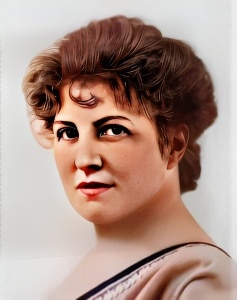 Sarah Blanche Sweet, born on June 18, 1896, was a trailblazing American silent film actress who left an indelible mark on the early motion picture industry.
Sarah Blanche Sweet, born on June 18, 1896, was a trailblazing American silent film actress who left an indelible mark on the early motion picture industry.
Renowned for her dynamic and independent roles, Sweet diverged from the conventional Griffith archetype of delicate femininity. Her career soared with starring roles, and a pivotal moment came with the 1911 Griffith thriller, “The Lonedale Operator.”
In 1913, she achieved a milestone by starring in “Judith of Bethulia,” Griffith’s inaugural feature film. While considered for the role of Elsie Stoneman in the groundbreaking “ The Birth of a Nation” (1915), she eventually parted ways with Griffith in 1914, joining Paramount (then Famous Players–Lasky) for a significant pay increase.
Biograph’s secrecy about its actors led to Sweet being billed as Daphne Wayne by the British distributor M. P. Sales. Undeterred, Sweet thrived in the 1910s, collaborating with Cecil B. DeMille and Marshall Neilan. Recognized by leading film critics as one of the premier actresses of the silent era, she made a lasting impact.
Sweet’s personal and professional life intertwined when she entered a publicized affair with Neilan, leading to his divorce from Gertrude Bambrick. Their marriage in 1922 was fraught with challenges, ultimately ending in 1929 due to Neilan’s alleged infidelity.
The early 1920s saw Sweet’s continued success, starring in the first film adaptation of Eugene O’Neill’s “Anna Christie” (1923). Her performance received acclaim, with The New York Times noting, “It would be difficult to imagine any actress doing better in this exacting role.”
Subsequent years featured Sweet in notable films like “Tess of the d’Urbervilles” and “The Sporting Venus,” both directed by Neilan. Transitioning to MGM, she became one of the studio’s leading stars. Amidst this, she played a pivotal role in “ The Avenging Conscience” (1914), showcasing her versatility and solidifying her status as a silent film luminary.




